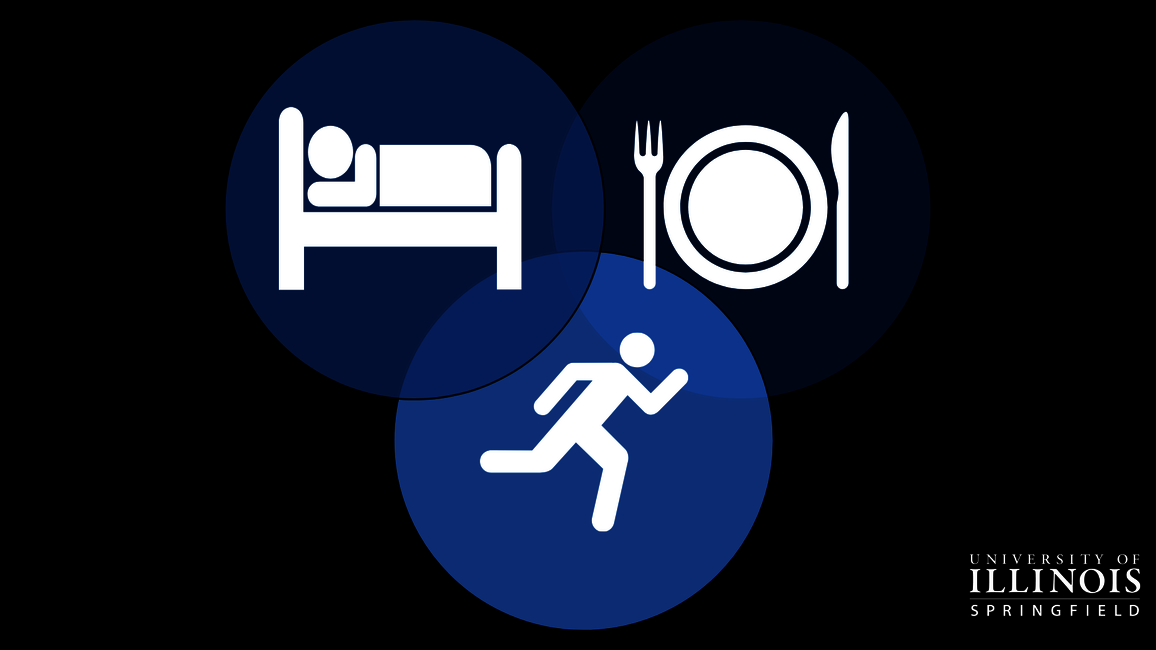One of the hardest transitions about college is getting used to the new normal of being on your own, sleeping well, cooking for yourself and exercising. It’s now up to you to make sure you are sleeping, eating and moving regularly. When we take care of ourselves first, we feel better and can be more active in our lives. Developing these new routines can be daunting, but they can also be empowering!
Sleep
Sleep is one of the most overlooked necessities for a healthy lifestyle. Most students assume that getting little to no sleep is a part of the college lifestyle. Sleep helps maintain and improve our emotional, physical and mental well-being. Those three factors influence all aspects of our lives, allow us to have meaningful relationships, efficient brain function and support our immune system. According to the National Institutes of Health, sleep may be more important than diet and exercise.
Creating a healthy sleep schedule starts with a consistent bedtime. Try to go to bed and wake up at the same time every day to help your body get into a routine and aim for 7-9 hours of sleep. To prepare your body for sleep, eliminate factors that interfere with restful sleep. Power off your cell phones, computers and televisions. Instead, pick a relaxing activity that will signal to your body that it is almost time for bed, such as reading, nightly chores, a skincare routine, a hot bath, listening to an audiobook or calming music. Avoid using your bed to study or eat meals. It may be hard when you live in a dorm and space is limited, but try to do your homework at your desk. That way your body and mind know when you’re in bed, it’s time to sleep.
Developing a Habit Takes Time
Remember, it takes time and consistency to develop a habit—usually about 30 days. To keep yourself accountable, try to find friends who want to adopt these new habits with you. Remember, you don’t have to have the perfect wind-down aesthetic. Start with one habit you can change, like getting to bed at the same time, then slowly add more habits. It’s a process, it doesn’t happen overnight, and it can be modified to best maximize your needs.
Nutrition
Nutrition has a significant impact on your mental health. It isn’t all about eating salads or intermediate fasting, it’s about balance. The important thing is to actually eat instead of trying to counteract your hunger later. When your body is depleted from poor care, you feel stressed and exhausted. This leaves you unmotivated to do anything like cook a meal, hang out with friends, or study for your classes. Be proactive by eating at designated mealtimes, and your mind will thank you.
Nourishing your body starts with being more mindful of your habits. For example, choosing granola in the morning is better than having just a coffee. Maybe you’re in the habit of skipping lunch when you have a full class load. Remember that if you pack a snack for the middle of the day, your mind will be able to focus more on your coursework. You could start learning how to cook with friends. There are many cooking videos on TikTok, YouTube, and Pinterest. It is perfectly normal and OK to make mistakes as you learn, but that is part of the fun! Also, don’t forget to hydrate throughout the day.
Movement
As you read this, you might be hunched over at your desk on your computer or your phone. This is your reminder to get up and MOVE! Movement is another essential part of maintaining your mental and physical health. Make a more conscious effort to move in your everyday life. For example, when you take a study break, take a short walk instead of scrolling on your phone. Instead of ordering your groceries for pick-up, go into the store and walk around while you shop. These little changes make a big difference.
If you’re already good at including intentional movement in your routine, you might be ready to take the next. UIS TRAC, has many resources for every fitness level. Visit the Athletics and Recreation page for a list of fitness classes, outdoor activities, club sports, and intramural sports. The hardest part is taking the first step and beginning a program. You can meet with a physical trainer at TRAC if you would like a more personalized approach, or you can join a workout class to make it more of a social activity. Remember that working out should be fun. If you aren’t enjoying it, pick a different activity. You can play badminton, basketball, or frisbee golf.
Need help?
Maintaining your mental and physical health can be hard when you’re trying to juggle all the stressors of life. It can be overwhelming, too. Start with one habit or area of focus. As you continue to learn and grow, you can add other routines. Slowly but surely your mental and physical health will thank you for being proactive. If you feel you need a little help or someone to talk to, you can always reach out to the UIS Counseling Center.
Contact
Counseling Center
- Office Location: HRB 64 (Human Resources Building).
- Email: counseling@uis.edu
TRAC
- Location: 2171 University Drive
- Email: campusrec@uis.edu



